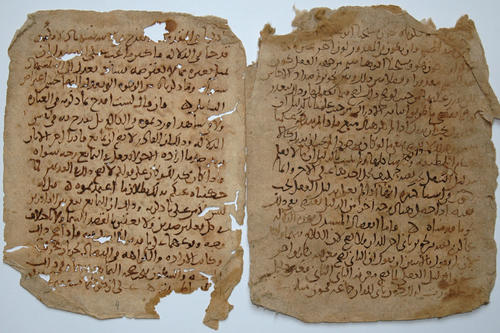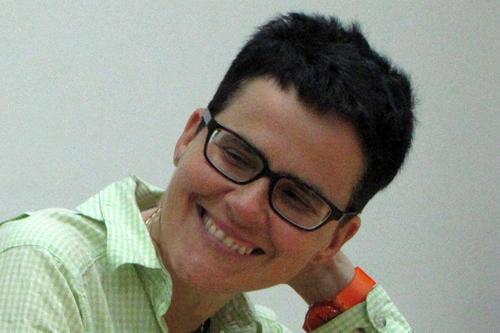Germans, Israelis, and Palestinians in Dahlem
Israeli scholar Miriam Frenkel to open second German-Israeli summer school at Freie Universität with a lecture on September 10
Sep 04, 2012
Genizah collections represent a previously largely neglected source for Islamic studies. This photo shows a piece from the "Kitab al-Mughni" by Abd al-Jabbar al-Hamadani.
Image Credit: Russische Nationalbibliothek, St. Petersburg
Professor Sabine Schmidtke, an Islamic studies scholar at Freie Universität Berlin, is one of the summer school’s organizers.
Image Credit: Privat
The second of a total of five German-Israeli summer school programs, titled “New Frontiers in Islamic Studies,” will be held in Berlin from September 9 to 14 this year. The event is supported by the Einstein Foundation Berlin. In her opening lecture, historian Miriam Frenkel, who has a doctorate and teaches at the Hebrew University of Jerusalem, will offer a look at the materials offered by the “genizah” – a source that has not been widely considered so far, especially for the field of intellectual history, and one that promises new insights for both Jewish and Islamic studies. A talk with Professor Sabine Schmidtke, a scholar of Islamic studies at Freie Universität Berlin and one of the summer school’s organizers.
Professor Schmidtke, the German-Israeli summer school program “New Frontiers in Islamic Studies” is taking place for the second time this year.
Yes, it is a cooperative initiative between Freie Universität Berlin and the Hebrew University of Jerusalem – but it would be more accurate to call it a trilateral project, since in addition to instructors and students from Germany and Israel, Palestinian students will also participate in the program. This cooperation is something very special in light of the current political situation.
The summer school’s topic is “The Genizah – An Unexploited Source for the Intellectual History of the Medieval World of Islam.” What is the program about?
The Hebrew term “genizah” refers to a storage area, which was usually part of a synagogue, where documents that were worn out or were no longer needed were placed in storage for a time before being buried in a religious rite. This is a characteristic of both religions, Judaism and Islam: documents cannot simply be destroyed or gotten rid of, since they could contain the name of God. As a result, people came up with other forms of “disposal,” such as burying the written materials. The texts contained in various genizah collections represent a source that has largely been neglected to date with regard to medieval intellectual history – a subdiscipline of the history of philosophy – in the Islamic world. They have been left largely unexplored by scholars of Islamic studies so far because it was assumed that the materials were mostly Jewish ones. But in fact, the genizah collections also include extensive Muslim documents, which offer new insights into intellectual history within Islamic studies in particular.
The opening lecture to be given by Israeli historian Miriam Frenkel on September 10 is titled “Texts as Objects, Objects as Texts: Material Culture in the Cairo Genizah.” What is the “Cairo Genizah”?
The term refers primarily to what is known as the Ben Ezra Genizah, in Cairo, which was rediscovered by chance in the late 19th century. The genizah contains documents from the 9th century to about the 16th. The Egyptian climate is highly favorable for paper, so the documents are still very well preserved, offering a wealth of information that is not only relevant for scholars of Jewish studies, but also for Islamic studies in particular. In her talk, Frenkel will focus on discussing the material history of the genizot – that’s the plural of genizah – and thus offer a look at one aspect of this very broad subject.
What further aspects of the genizah will be treated during the summer school?
Our goal is to cover the entire spectrum for this topic. The genizot include materials from various areas. That includes documents having to do with intellectual history – theology, law, and philosophy – but also medicine and natural sciences as well as numerous archival materials, meaning documents from everyday life, like marriage certificates, receipts, testaments, and contracts. Our goal is to give summer school participants a comprehensive overview of the materials along with the skills and knowledge they need in order to take the genizah documents into account in their own research.
Further Information
Public Lecture:
Dr. Miriam Frenkel (the Hebrew University of Jerusalem):
- “Texts as Objects, Objects as Texts: Material Culture in the Cairo Geniza”
- Monday, September 10, 2012, 6:00 p.m.
- Berlin State Library (Staatsbibliothek zu Berlin), Potsdamer Str. 33, 10785 Berlin-Tiergarten
German-Israeli Summer Schools
The second summer school, this one on the topic of “The Genizah: An Unexploited Source for the Intellectual History of the Medieval World of Islam,” is scheduled to take place at the Institute of Islamic Studies at Freie Universität Berlin from September 9 to 14, 2012. The initiative is supported by the Einstein Foundation Berlin. The series will continue in the summer of 2013 with the topic “Arabic Linguistics: Linguistic Thinking in the Middle Ages, Modern Approaches to the Language, the Development of Dialects and Sociolinguistics.” The series was initiated by Professor Sabine Schmidtke, of the Institute of Islamic Studies at Freie Universität Berlin, and Professor Reuven Amitai, of the Hebrew University of Jerusalem. The first German-Israeli summer school was held at the Institute for Advanced Studies at the Hebrew University of Jerusalem in summer of 2011 with the topic “The Political, Social and Intellectual History in the Mamluk and Mongol Empires: A Comparative Perspective.”
This text was originally published in German in campus.leben on September 4, 2012.


